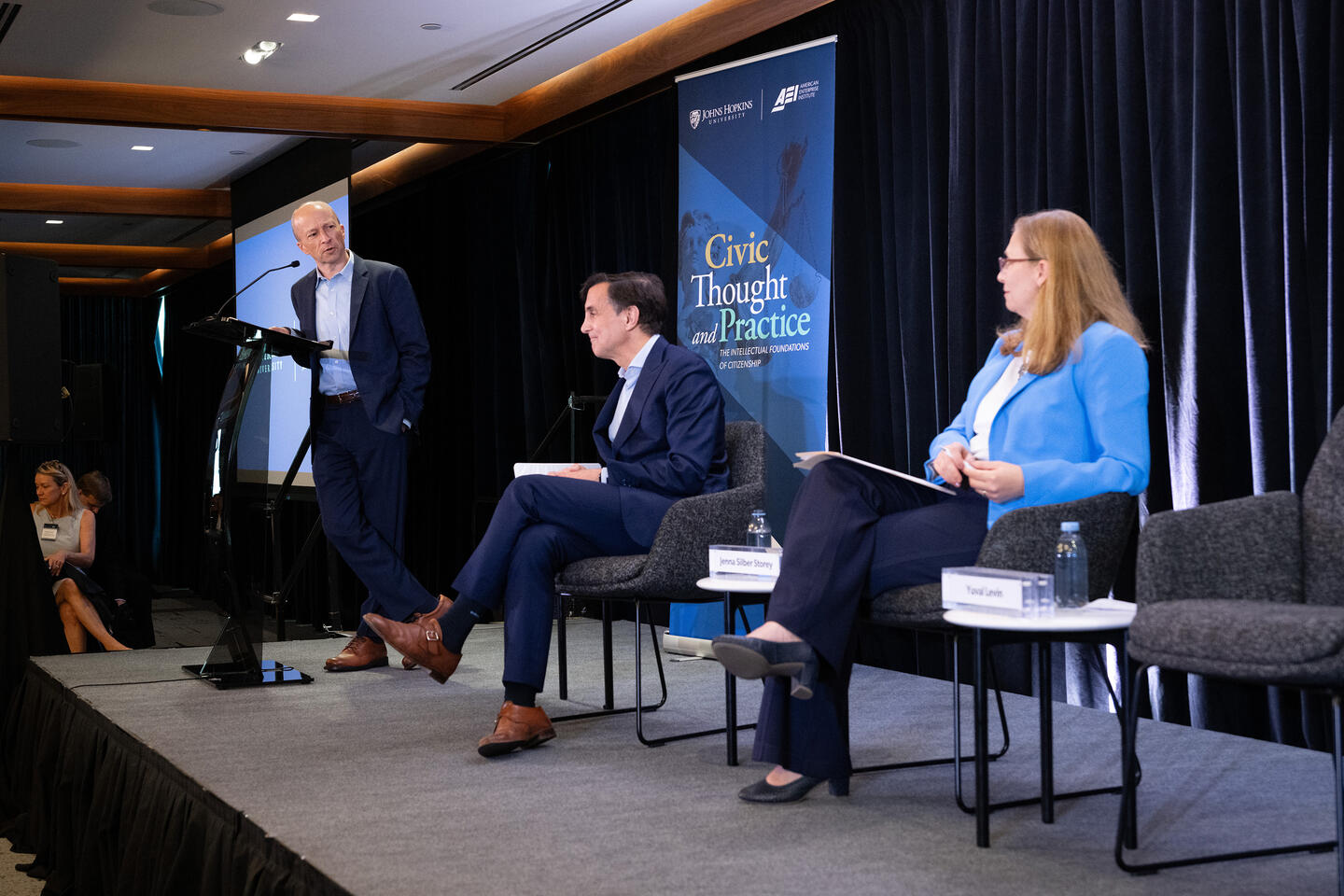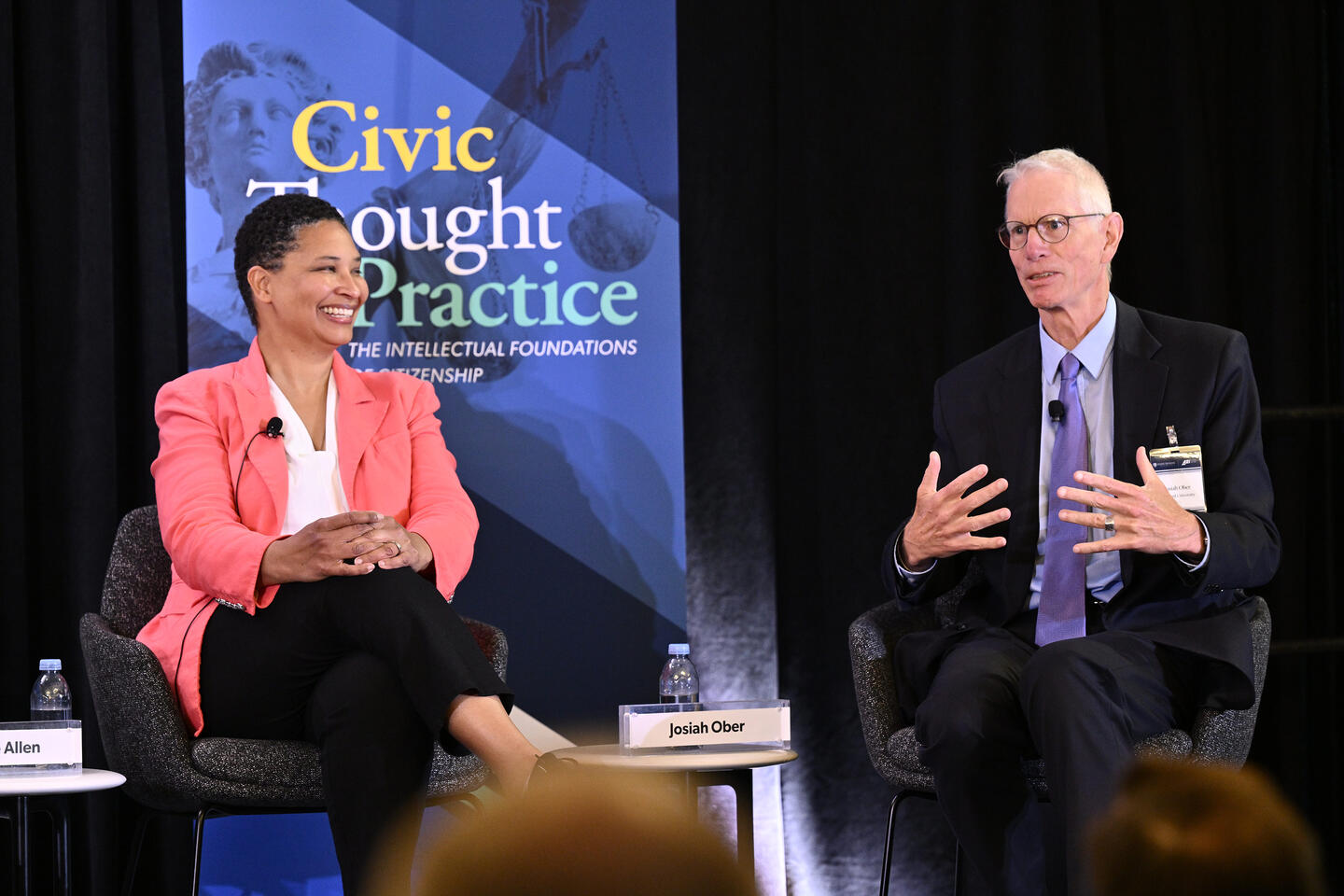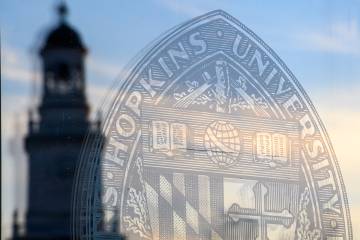- Name
- Johns Hopkins Media Relations
- jhunews@jhu.edu
- Office phone
- 443-997-9009
As the U.S. faces the continued rise of political polarization, scholars and policymakers from across the ideological spectrum came together at a two-day conference last month—hosted jointly by Johns Hopkins University and the American Enterprise Institute, a leading center-right think tank based in D.C.—to discuss the role of universities in helping students become more informed and engaged citizens.
The event at the Johns Hopkins University Bloomberg Center in Washington, D.C., Civic Thought and Practice: The Intellectual Foundations of Citizenship, brought together policymakers, philanthropists, and scholars from more than 50 universities to discuss how institutions of higher education can help strengthen civic life through a more academically grounded civic education—an effort that's seen major growth across colleges and universities in recent years.
"I believe that this conference can be a meaningful next step to building on the momentum that we are seeing, and fulfilling the obligation that we owe to society and to the students and scholars who care deeply about sustaining the great civic experiment that is this nation," JHU President Ron Daniels said.

Image caption: From left to right: American Enterprise Institute senior fellow Yuval Levin, Johns Hopkins University President Ron Daniels, and AEI senior fellow Jenna Storey.
Image credit: Kaveh Sardari for Johns Hopkins University
Yuval Levin, senior fellow and director of social, cultural, and constitutional studies at AEI, said: "We have to think about how to advance the well-being of our country by taking up the cause of renewing the central institutions of free society. The university is plainly one of those essential institutions."
Among the faculty from across the nation who participated at the conference were Josiah Ober, professor of Political Science and Classics at Stanford University and founder of the Stanford Civics Initiative; Paul Carrese, professor in the School of Civic & Economic Thought and Leadership at Arizona State University; Danielle Allen, professor and director of the Allen Lab for Democracy Renovation and the Democratic Knowledge Project at Harvard University; Lee Strang, executive director of the Salmon P. Chase Center for Civics, Culture, and Society at The Ohio State University; and Daniel Carpenter, chair of the Department of Government at Harvard University.
Participants from Johns Hopkins included Chris Celenza, dean of the Krieger School of Arts and Sciences; Dean Moyar, professor of philosophy and vice dean for humanities; Andrew Perrin, SNF Agora professor and chair of sociology; Amy Binder, SNF Agora professor of sociology; and Simon Halliday, assistant professor of economics.
Experts at the conference discussed topics such as the opportunities and challenges our current political moment offers to university-level civic education, what the contours of an intellectually ambitious and deeply formative version of university-level civic education might be, the ways in which civic education can be embedded in the university such that it endures, and how students can learn to engage in dialogue across a wide range of perspectives and viewpoints.
"We aren't just as universities producing workers, we're not just producing people who land in jobs, we're producing citizens," said William Howell, dean of the newly established Johns Hopkins School of Government and Policy, at the conference. "There's an opportunity in this conference to ask in a big, capacious way what the obligations are of universities to produce those citizens."
Jenna Storey, senior fellow at the American Enterprise Institute, said: "Our universities have unique resources that should be brought to bear on our civic crisis. They can help cultivate not only the skills and dispositions of young citizens, but also an understanding of the challenges self-government has encountered over the course of history, and the reasons behind the design and evolution of the American constitutional system. The emerging field of civic thought, in my view, aims to address all of these competencies."
Allen added that exposing students to a broad range of viewpoints is key to preparing them to be informed citizens.
"For me, civic strength has two things at its heart," she said. "It's that question of our mutual relations with one another—despite all of our divergencies of ideology and differences of identity, we can form relationships, and they have to be in mutual respect—and then secondly, it is about core values of constitutionalism."

Image caption: Danielle Allen, professor and director of the Allen Lab for Democracy Renovation and the Democratic Knowledge Project at Harvard University, and Josiah Ober, professor of Political Science and Classics at Stanford University and founder of the Stanford Civics Initiative.
Image credit: Kaveh Sardari for Johns Hopkins University
While intellectual pluralism in higher education is necessary, it isn't the ultimate goal, Howell argued. The next step is activating that diversity of ideas.
"What we're supposed to be doing is pursuing and understanding truth as an individual and a collective enterprise," he said. "We will be better at the work of truth-seeking in our scholarship, in our seminars, in our engagement with one another, in calling each other out, if we can instantiate and put to good purpose intellectual diversity."
The conference was the first public event that has stemmed from the collaborative work between Johns Hopkins and AEI that began in 2023. Since then, the two institutions have worked together to put into practice their shared dedication to engaging diverse perspectives through initiatives and programs including:
- The Civic Thought Project, a working group of scholars from JHU and AEI that organized the Civic Thought and Practice conference and that has been exploring how academic inquiry can help cultivate the capacity for thinking and acting as a citizen.
- The JHU-AEI Fellowship Exchange Program, which brings together scholars from JHU and AEI to work on research, teaching, and other projects, and to participate in the intellectual life of each other's institutions.
- The Graduate Student Intellectual Diversity Initiative, which aims to encourage conservative, libertarian and heterodox students and graduates to consider a career in higher education, and to support them in their efforts.
These programs were forged in the wake of an October 2023 event at AEI with Daniels, based on his 2021 book, What Universities Owe Democracy. In that book, Daniels expressed concern that universities had for too long "assumed our students had an understanding of democratic citizenship that they did not in fact have." He encouraged faculty to help students build a "bedrock of democratic knowledge."









